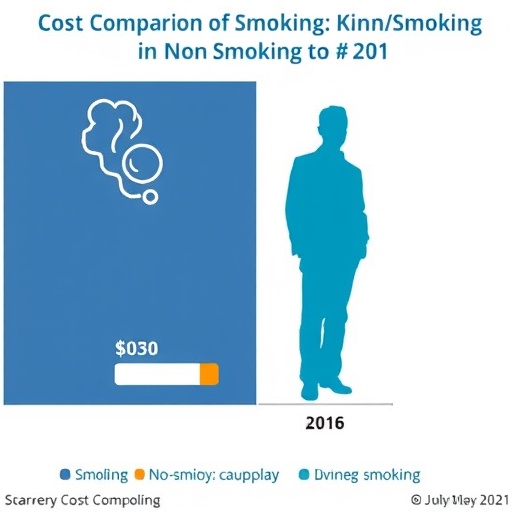Tobacco smoking has long been recognized as a significant public health concern, and its implications extend far beyond the realm of individual health. A systematic review and meta-analysis conducted by Sweis et al. sheds light on the economic burden associated with self-reported tobacco smoking in comparison to non-smoking. This nuanced investigation offers critical insights into the direct healthcare costs attributed to smoking, which are often underestimated in discussions surrounding tobacco use and policy formation.
At its core, the research identifies the staggering expenses that smoking imposes on healthcare systems. Although the health risks of tobacco use are widely acknowledged, the financial implications remain a topic that requires more rigorous examination. The study meticulously analyzed existing data on healthcare costs, delving into the resources spent on treating smoking-related illnesses. This evaluation is vital for understanding the broader economic impacts of tobacco use on society and healthcare systems.
The methodology employed by Sweis and colleagues involved a comprehensive literature search, encompassing a diverse array of studies that report on direct health care costs incurred by smokers compared to non-smokers. By synthesizing these findings, the authors aimed to establish a clearer understanding of the correlation between smoking status and healthcare expenditures. Importantly, the inclusion of various demographics and health conditions in the analysis allowed for a robust examination of the economic burden associated with tobacco.
Moreover, the nuances of the economic burden associated with smoking are compounded by the social determinants of health that influence smoking behaviors. Socioeconomic status, access to healthcare, and education levels play a critical role in shaping smoking prevalence and health outcomes. The research highlights the importance of addressing these factors in the context of smoking cessation efforts and public health strategies.
Understanding the direct healthcare costs linked to smoking also opens up discussions regarding policy changes. Tobacco taxation, regulations on advertising, and smoking cessation programs are all strategies that can mitigate the financial burden of smoking on healthcare systems. By leveraging evidence from studies like the one conducted by Sweis et al., policymakers can make informed decisions that prioritize public health while also considering economic factors.
The implications of this research extend beyond healthcare costs; the findings have significant implications for workplace environments. Employers are increasingly aware of the costs associated with smoking, which can include increased absenteeism, decreased productivity, and higher insurance premiums. Organizations are now more motivated than ever to implement smoking cessation programs and support a healthier workforce.
Furthermore, the evidence presented in this study reinforces the notion that preventing tobacco use from young ages can significantly reduce healthcare costs in the future. Educational initiatives and community programs aimed at discouraging tobacco use among youth are critical components of tobacco control efforts. By investing in prevention, society may ultimately save considerable healthcare resources.
The economic burden of tobacco smoking also highlights the need for continuous research in the field. As tobacco products evolve, especially with the advent of e-cigarettes and vape devices, understanding their impact on healthcare costs becomes increasingly complex. Future studies should explore not only the costs associated with traditional smoking but also those linked to emerging tobacco products, as these could shape healthcare expenditures in unforeseen ways.
In conclusion, the systematic review and meta-analysis conducted by Sweis et al. underscore the financial implications of tobacco smoking on healthcare systems. The significant economic burden felt by smokers compared to non-smokers serves as a clarion call for public health interventions and policy changes aimed at reducing tobacco use. As we navigate the complexities of smoking in contemporary society, the findings of this research provide a crucial framework for future studies aimed at elucidating the relationships between tobacco use, health outcomes, and economic costs.
This research emphasizes the importance of collaboration among stakeholders in the public health arena. By uniting efforts from healthcare providers, policymakers, and communities, we can effectively address the persistent issue of tobacco smoking and its associated economic toll. Through collective action, the hope is to reduce smoking prevalence and the consequential healthcare costs, ultimately striving for a healthier, smoke-free society.
In navigating the complexities of public health, economic analyses such as those presented by Sweis et al. serve as essential tools for advancing a holistic understanding of tobacco-related burdens. As we critique and develop health policies moving forward, the information gleaned from such studies will play an integral role in shaping evidence-based strategies to combat tobacco use and foster a healthier population for the future.
Subject of Research: Economic Burden of Tobacco Smoking Compared to Non-Smoking
Article Title: Economic Burden of Self-Reported Tobacco Smoking Compared with Non-Smoking: Systematic Review and Meta-Analysis of Direct Health Care Costs
Article References:
Sweis, N.J., Elfessi, Z.Z., Rubinstein, I. et al. Economic Burden of Self-Reported Tobacco Smoking Compared with Non-Smoking: Systematic Review and Meta-Analysis of Direct Health Care Costs.
Adv Ther (2025). https://doi.org/10.1007/s12325-025-03318-0
Image Credits: AI Generated
DOI: 10.1007/s12325-025-03318-0
Keywords: Tobacco smoking, Economic burden, Direct healthcare costs, Public health policy, Smoking cessation, Healthcare expenditures, Socioeconomic factors.
Tags: cost comparison of smoking and non-smokingdirect healthcare costs of smokingeconomic burden of tobacco useevaluating smoking-related healthcare expendituresfinancial impact of smoking on healthcare systemshealthcare costs of smoking-related illnessesmeta-analysis of tobacco expensespublic health implications of smokingsmoking vs non-smoking healthcare expendituressystematic review of smoking coststobacco use and policy formationunderstanding the economics of tobacco use





